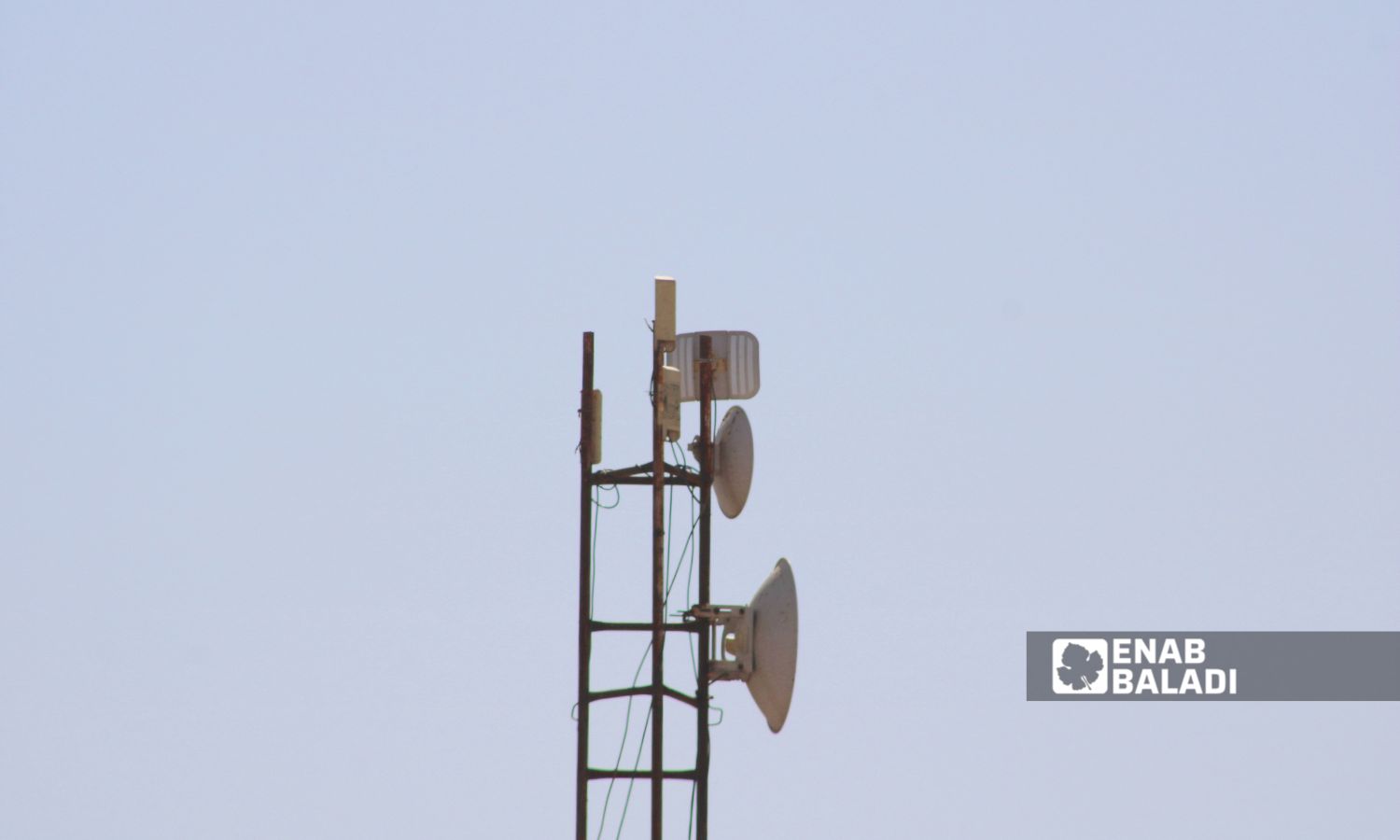



Enab Baladi – Ras al-Ain
Residents of villages in the Ras al-Ain countryside, northwest of al-Hasakah, complain of frequent outages and poor internet services, disrupting their work and communications.
According to residents interviewed by Enab Baladi, these complaints have not received any response from the private internet service providers in hundreds of villages, in addition to the city, which has a population of about 115,000.
According to Enab Baladi‘s correspondent who monitored internet package prices in Ras al-Ain, the price of a 1 MB package is 10 US dollars (150,000 Syrian pounds), the price of a 4 MB package is 14 dollars, an 8 MB package is available for 20 dollars, a 10 MB package costs 25 dollars, and the maximum price for a 20 MB package reaches 30 dollars.
These prices are considered high compared to the service provided and to the daily wages of workers in the area, which range between 80,000 and 100,000 Syrian pounds (7 dollars) per day.
Residents of the village of Um al-Asafir, east of Ras al-Ain, suffer from frequent internet outages, negatively affecting their daily lives and their businesses, according to Muhammad al-Qattan, a resident of the village.
Al-Qattan explained to Enab Baladi that residents rely on the internet not only for communication with family and friends but also to accomplish commercial and agricultural work.
He mentioned that private internet companies do not provide any clear solutions or tangible improvements, which increases their suffering and makes them feel marginalized.
For his part, Qusai al-Aziz from the village of al-Mabrouka, west of Ras al-Ain, said that residents’ suffering is increasing due to the ongoing outages of internet services, which has become a real crisis disrupting their daily lives.
Al-Aziz added to Enab Baladi that residents feel like they are “victims” of exploitation by the private companies that do not care about their demands, noting that the prices do not correspond to the “poor” service they provide.
Internet companies rely on antennas in the countryside to receive the network from broadcasting towers located in the city, which reduces the quality of service.
Despite the increased demand for the internet in the villages of Ras al-Ain, companies have not improved the infrastructure in rural areas, leading to frequent outages and slow internet speeds.
Abdullah al-Azzam, the owner of an internet company in Ras al-Ain, told Enab Baladi that there are several reasons leading to the weak internet services in rural areas, noting that relying on antennas to receive the network from the city broadcasting towers is the only available option for them.
He mentioned that companies do not have the financial capacity to extend and connect main networks to the countryside, which requires “very high” costs.
He added that the villages have not seen any improvement in internet services since the period of the Syrian regime’s control, and no changes have occurred even during the period of control by the Autonomous Administration of North and East Syria (AANES) and the Syrian Interim Government (SIG) since 2019, confirming that there is no suitable infrastructure in these areas.
He pointed out that the necessary investments to improve the network have not been implemented in the required manner, making the users’ experience in these villages “very bad.”
Residents in the countryside rely on internet services via Wi-Fi provided by some suppliers, and Turkish telecom networks do not operate effectively due to weak coverage.
The spokesperson for the local council in Ras al-Ain, Ziad Maliki, told Enab Baladi that providing internet in the countryside is among the council’s priorities after completing the city’s project, through the optical cable coming from Turkey.
He explained that the countryside, which consists of 300 villages, faces significant challenges in finding immediate solutions, as current efforts are focused on delivering the internet network to the city, which contains 13 “huge” neighborhoods, and extension works are still ongoing.
He added that the local council will work to demand that private companies in the countryside improve the quality of internet services provided to the area and adjust internet packages for the benefit of the residents.
He noted that the council will hold regular meetings with internet companies and residents to discuss ways to improve internet services in the countryside and ensure that companies commit to performing their work at the highest level of efficiency.
There is no mechanism to regulate internet prices in Ras al-Ain due to the local council’s inability to organize prices, given the presence of many internet service providers in the area.
Prices are determined by the companies based on agreements between the supplier and the local distributor, as local distributors are the primary beneficiaries of rising prices, gaining larger profits as prices increase.
Turkey administers the city of Ras al-Ain in northern Syria, and public service institutions there are managed through the Urfa provincial center in Turkey, with the local council in the city overseeing the implementation of service projects, which are considered timid compared to those in northern Aleppo province, which is managed in the same way.
Prices for internet packages are experiencing repeated increases for most lines in northern Syria, in addition to weaknesses in some internet networks and outages in others, the latest of which occurred in July, with the cutoff on the Turkish side after protests took place in the area rejecting violations against refugees in Turkey.
if you think the article contain wrong information or you have additional details Send Correction